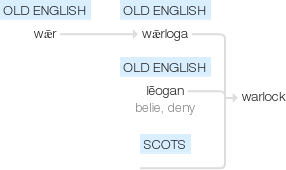Warlock
Old English wǣrloga ‘traitor, scoundrel, monster’, also ‘the Devil’, from wǣr ‘covenant’ + an element related to lēogan ‘belie, deny’. From its application to the Devil, the word was transferred in Middle English to a person in league with the Devil, and hence a sorcerer. It was chiefly Scots until given wider currency by Sir Walter Scott.
wiktionary
From Middle English warloghe, warlowe, warloȝe, from Old English wǣrloga(“traitor, deceiver”, literally “truce-breaker”), from wǣr(“covenant, truce, pact, promise”) (from Proto-Indo-European *weh₁-(“true”); whence also Latin vērus) + loga(“liar”), from Proto-Germanic *lugô, related to Old English lēogan (whence English lie). The hard -ck ending originated in Scottish and Northern English, like the sense "male magic-user" (from the notion that such men were in league with the Devil and had thus broken their baptismal vows / betrayed Christianity). Cognate with Old High German wārlogo(“truce-breaker, traitor”).
A few writers alternatively propose derivation from Old Norse varðlokkur(“caller of spirits”), [1] but as the OED notes, this is implausible due to the extreme rarity of the Norse word and because forms without hard -k, which are consistent with the Old English etymology (“traitor”), are attested earlier than forms with -k, [2] and forms with -ð- are not attested.
etymonline
warlock (n.)
Old English wærloga "traitor, liar, enemy, devil," from wær "faith, fidelity; a compact, agreement, covenant," from Proto-Germanic *wera- (source also of Old High German wara "truth," Old Norse varar "solemn promise, vow"), from PIE root *were-o- "true, trustworthy." Second element is an agent noun related to leogan "to lie" (see lie (v.1); and compare Old English wordloga "deceiver, liar").
Original primary sense seems to have been "oath-breaker;" given special application to the devil (c. 1000), but also used of giants and cannibals. Meaning "one in league with the devil" is recorded from c. 1300. Ending in -ck (1680s) and meaning "male equivalent of a witch" (1560s) are from Scottish. Related: Warlockery.
